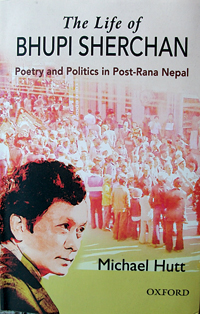Bhupi Sherchan, according to Michael Hutt, was “probably the most popular and widely-read poet” in Nepali during the 1970s and 80s. With this new book, Professor Hutt not only gives us the life story of this well-known poet, but makes available a large body of his work in English.
 Bhupi’s popularity was due to the realistic anti-establishment themes he chose and his everyday language that was accessible to any Nepali. Nepali poets in the past, with a few notable exceptions, had filled their poems with Sanskrit words and allusions accessible only to the classically educated. Then, in the sixties, younger poets went for allusions to Western mythology and literature that were equally obscure to most Nepalis. It was Bhupi Sherchan’s great accomplishment to largely eliminate classical and foreign influences. According to one admirer, “In Bhupi’s poetry, Nepali has been restored to its pristine glory.”
Bhupi’s popularity was due to the realistic anti-establishment themes he chose and his everyday language that was accessible to any Nepali. Nepali poets in the past, with a few notable exceptions, had filled their poems with Sanskrit words and allusions accessible only to the classically educated. Then, in the sixties, younger poets went for allusions to Western mythology and literature that were equally obscure to most Nepalis. It was Bhupi Sherchan’s great accomplishment to largely eliminate classical and foreign influences. According to one admirer, “In Bhupi’s poetry, Nepali has been restored to its pristine glory.”
For those of us with limited ability to read Nepali, Professor Hutt has translated a wide variety of the poems, ranging from the obscure early ones to 38 poems from Bhupi’s most famous collection, A Blind Man in a Revolving Chair. Shedding light, as they do, on the turbulent pre-1990 period, Bhupi’s poems are seldom cheerful. The prevailing tone, as Professor Hutt tells us, is “one of pessimism bordering on despair”. You only need to look at some of their titles to get an idea of their mood. “Midday in the Cold Sleep”, “My Country’s History Seems Wrong to Me”, “A Blind Man in a Revolving Chair”, “This is a Land of Hearsay and Rumour”.
One of the most remarkable aspects of these poems from the perspective of 2010 is that they seem so current though they were written so long ago. Here, for example, are some excerpts from a 1959 poem called “The History of Darkness”.
Whether by day or whether by night
This courtyard of mine
Is always dark
He goes on to explain that “It was not like this until a few years ago” the reason being that:
A rich man like a Himal
Built a sky-touching palace
With his boundless wealth ….
This palace has blocked the sun.
The poem quoted above is not the only instance when the reader is likely to wonder if anything ever has changed or ever will. Just take a look at the opening lines of “This is a Land of Hearsay and Rumour”.
Where deaf men wearing earphones
Are judges of musical contests;
And people whose souls have been turned into stones
Are assessors of poetry.
Or the even more telling (and contemporary)
Where those who can trade in souls
Like shares on a stock exchange
Are the leaders,
Where those whose foreheads are wrinkled like roofing steel
Lead our youth ever onward.
Bhupi may have been a great poet, but it has to be admitted that his life was anything but exemplary. The son of a wealthy Thakali businessman, he wrote communist-inspired poems under the name of “Sarvahara” (proletariat), while having no qualms about living off the family fortune. As a family man and father he was never at home, and after 14 years of marriage he left his wife and their six children for a younger woman of the Rana clan. Late in life, he completely abandoned his left-wing principles and began writing in praise of King Birendra. He more or less intentionally drank and smoked himself to death at a relatively young age despite being responsible for his two families.
But who expects poets to live exemplary lives? As Hutt perceptively concludes, “A simple, flawless human being, if such a creature were ever born, would not write any poetry that deserved to be read.”
This book is really a must-read for anyone interested in trying to grope his way to understanding what is going on not only in Nepali literature, but in this land of hearsay and rumour itself.
The Life of Bhupi Sherchan, Poetry and Politics in Post-Rana Nepal by Michael Hutt
Oxford University Press, 2010, 201 pages, NRs920










